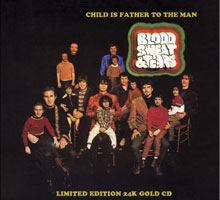Blood, Sweat & Tears • Child Is Father To The Man
lood, Sweat & Tears' very first album, Child Is Father To The Man, is something of the redheaded stepchild of the band's recorded output, overlooked due to its one-off feel -- the band that recorded this album was only together for this one session -- and the string of hits that emerged from the iteration of the band that followed. But while this Al Kooper-lead group may have gotten short shrift, it did not lack for inventive music-making and an enduring legacy. One listen to Child Is Father To The Man makes one wonder, despite the commercial success of the new group, what might have been had this particular assembly stayed together. The music on this album is less the pop-rock-jazz melding of the subsequent group’s musical leanings and more of the time in which it was recorded. Ergo, it’s a rock album, but it had one very unique element, especially for the time, that helped it stand out as not just another rock album: a full-fledged horn section. Listen to "I Can’t Quit Her." Kooper’s keyboard work and vocals are a wonder of depth and passion, the rhythm section of drummer Bobby Colomby and bassist Jim Fielder lays down the perfect beat, guitarist Steve Katz tucks in some tasty guitar licks, but it is the horn section of alto saxophonist Fred Lipsius, trumpet/flugelhorn players Randy Brecker (yes, that Randy Brecker) and Jerry Weiss, and trombonist Dick Halligan that push what might otherwise be just another decent song to transcend the music of its time. The music shows influences as diverse as straight-ahead rock, Donovan-inspired folk-rock and electrified blues -- all supported and enhanced by that wonderful horn section. An added bonus is the inclusion of four demo cuts that reveal the sound of the band in the raw, giving great insight into what a good producer and engineer can accomplish. The sound of Child Is Father To The Man is something of a mixed bag. The tone and timbre seem pretty close to right (always hard to tell completely when electronic instruments are involved), and the excellent separation of the instruments makes each one pop out of the mix with startling clarity. Dynamics are also excellent for the period. Vocals are a tad flat, but not disturbingly so. The real mar on an otherwise wonderful recording (and remaster) is the left-right balance. Kooper’s voice comes from the left, while all backing vocals emerge from the right. There's a hole in the middle that even Robert Pincus of Impex and Kevin Gray of Cohearent Audio, who jointly oversaw the remastering, couldn’t fix. The sound is much improved from that of the 1990 CD issue I had on hand for comparison. Also, the reissue is world's quieter, the music emerging from a more jet-black background. While other reissues of this album may also sound good,
they are no longer available new and command premium prices on the used market, making
this the version to buy, for both the music and sound. |

